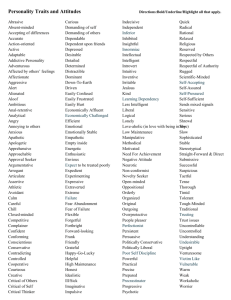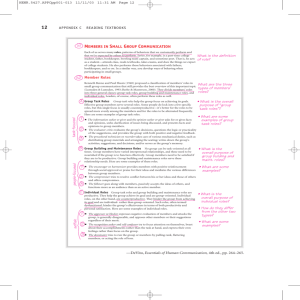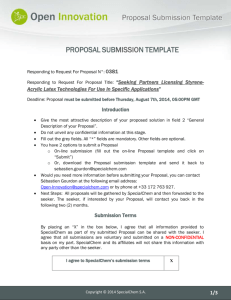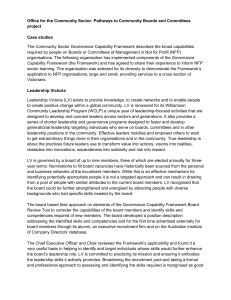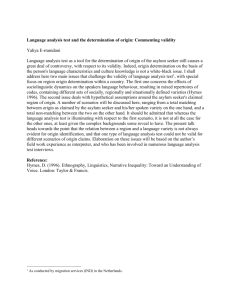Work for the Dole 2014-2015
advertisement
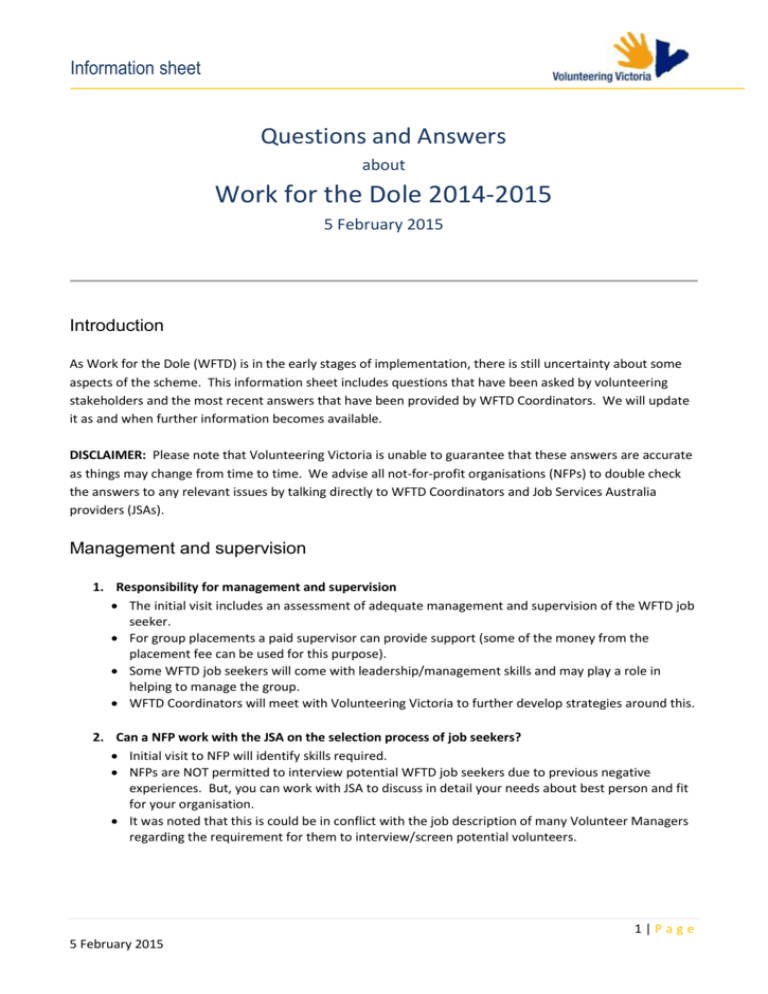
Information sheet Questions and Answers about Work for the Dole 2014-2015 5 February 2015 Introduction As Work for the Dole (WFTD) is in the early stages of implementation, there is still uncertainty about some aspects of the scheme. This information sheet includes questions that have been asked by volunteering stakeholders and the most recent answers that have been provided by WFTD Coordinators. We will update it as and when further information becomes available. DISCLAIMER: Please note that Volunteering Victoria is unable to guarantee that these answers are accurate as things may change from time to time. We advise all not-for-profit organisations (NFPs) to double check the answers to any relevant issues by talking directly to WFTD Coordinators and Job Services Australia providers (JSAs). Management and supervision 1. Responsibility for management and supervision The initial visit includes an assessment of adequate management and supervision of the WFTD job seeker. For group placements a paid supervisor can provide support (some of the money from the placement fee can be used for this purpose). Some WFTD job seekers will come with leadership/management skills and may play a role in helping to manage the group. WFTD Coordinators will meet with Volunteering Victoria to further develop strategies around this. 2. Can a NFP work with the JSA on the selection process of job seekers? Initial visit to NFP will identify skills required. NFPs are NOT permitted to interview potential WFTD job seekers due to previous negative experiences. But, you can work with JSA to discuss in detail your needs about best person and fit for your organisation. It was noted that this is could be in conflict with the job description of many Volunteer Managers regarding the requirement for them to interview/screen potential volunteers. 1|Page 5 February 2015 Information sheet 3. What is the responsibility of the VIO in regard to reporting and placement if participants with mental illness (or other health issues) have periods of ill health and are unable to participate? Host NFP needs to provide strong supervision and awareness of requirements of the WFTD job seeker, and have some flexibility. If a WFTD job seeker cannot attend due to illness, a replacement participant will be arranged by JSA (but no extra money for training/induction). If the replacement job seeker stays longer than the original arrangement, a pro rata payment may be available. 4. What happens to the WFTD job seeker after the 6 months? Is there any guarantee of paid position or how are they supported? Avocare have Jobs Connect and try and place people. Organisations often offer extra support to the job seeker, including helping them to develop the resume etc. No obligation on NFP to offer employment after placement. JSA must continue to support them to find employment. Contractual issues 5. Is the agreement or contract to host a WFTD placement between the NFP and the JSA, or the Federal Government through the WFTD Coordinator? Does the contract clarify the placement terms, the payment for placement, when the placement will end, which party is responsible for insurance and what the NFP’s rights are if a placement is not working out? The agreement is between the JSA and the host NFP. The contract will clarify placement terms, budget, which party is responsible for the insurance (the JSA) and the host organisation’s rights if a placement is not satisfactory. 6. How is it made clear that the WFTD placement is not an employment relationship (i.e. that the NFP will not owe the WFTD job seeker annual leave, long service leave, super etc.)? The WFTD placement is required as part of an eligible job seeker’s requirements to receive benefits. It is a condition of the placement that it does not take the place of a paid position and this will be clear in the terms of the contract between the JSA and the host NFP. 7. If a WFTD participant works over the 25 hours a week requirement, (e.g. they do 35 hours a week) are they still a WFTD participant for that extra time? Or is that extra work being done as a volunteer / casual employee? The activity needs to run according to a defined set of hours. Any hours that the WFTD job seeker works outside of this is not considered part of the WFTD activity, and any such arrangement would be between the job seeker and the NFP. The Department of Employment’s expectation is that any additional work would be paid. 8. If an NFP works with Avocare to facilitate a project how is the funding distributed and which organisation is contracted to provide the placement? Hosts can provide both individual and group places in their own right without those places being brokered by Avocare. The expectation is that a greater percentage of WFTD Coordinator activities are external to Avocare as broker. 2|Page 5 February 2015 Information sheet If this question is regarding an instance where an NFP is facilitating a group project and Avocare is coordinating this project, then Avocare is the contracted entity. Funds for the project would go to Avocare. This is only in relation to group activities, in instances where the NFP does not believe it has expertise to facilitate a project itself. Any monetary benefits to the NFP would only be relating to rent or access funds, bearing in mind that the first and foremost benefit to the host is the activity itself. 9. If the work/tasks agreed on for the placement are achieved before the end of the six months and there is no longer a role for the WFTD job seeker in that placement can the placement be terminated? What happens to the job seeker in this situation? When scoping projects in the initial set up phase, the WFTD Coordinator will look to secure 6 months, with the goal being to only approve 6 month projects. However, there may be instances where an activity could take place for an alternate period of time, pending approval from the Department of Employment on a case-by-case basis. If the task is completed before the end of the 6 month placement, new tasks can be added (if desired), or the placement can terminated. The WFTD job seeker must then be placed in an alternate activity, which would be the responsibility of the JSA. Payments 10. Is transport assistance available to WFTD job seekers? $20.80 per fortnight. 11. We have heard that each WFTD placement has $600 attached to it and about $21,000 for group x10 placements. Can the JSA keep some of the money allocated for each placement? How is the amount of funding to be paid to the NFP determined? The funding is to be negotiated between the JSA and the host NFP. To clarify, a group activity does not have a maximum number of participants, only that it must have more than one participant. Each place is allocated $2,100 worth of funds. An individual hosted place attracts up to $600; all costs associated with this place must not exceed $600. Costs also include risk assessments undertaken by the JSA and other support such as job seeker support, police and WWC checks and host NFP costs. Individual places of up to $600 do not need to be acquitted whilst group places at $2,100 each do need to be acquitted. However, while the $600 is not acquitted, the JSA must record all elements of the expenditure. 12. At what point does the payment pass to the host NFP? For example, if the NFP does all the work to develop a place and appoint a supervisor, is payment made when the first WFTD job seeker is placed with the host NFP? What if that person leaves within the first few days of their placement? For an individual host placement, funding is triggered when WFTD job seeker first turns up to the activity. If the activity runs for less than or more than 6 months then this will be on a pro-rata basis. The amount and manner (i.e. timing) in which the funding is released is negotiated between the JSA and the host at the start of the Agreement. 3|Page 5 February 2015 Information sheet 13. Can a placement be for less than six months? If one host NFP is only able to provide a 3 month placement and another 3 months is offered by a similar organisation in a similar placement, how are the funds allocated? The expectation is that places will be negotiated between 12-15 hours for a 6 month duration. It is recognised that there will be exceptions. In this case the funding will be on a pro rata basis and the WFTD job seeker will be placed with an alternative host(s) to complete their mutual obligation requirements. Any activities running for less than 6 months need to be approved by the Department of Employment. 14. As above but in regard to the number of hours per week available within an organisation for a WFTD placement? 12-15 hours per week is the expectation. However, where a host NFP is not able to commit to those hours, each activity proposal will be considered on a case-by-case basis. Roles and activities 15. What can and can’t WFTD job seekers do on placements? We have heard that they cannot drive or have client contact. Are there other restrictions? How does the host NFP find out about these? Are they in the contract / agreement? The overall expectation is that the WFTD activities will be in a safe environment that does not pose a health and safety risk. It is recommended that host NFPs contact the WFTD Coordinator in the first instance to discuss the particular circumstances of the host. At this time the WFTD Coordinator will be able to advise of the suitability of the host and the activity, or to help the host to identify suitable WFTD activities that meet the needs of the host, WFTD jobseeker and the community. As per the Department of Employment’s guidelines, WFTD activities must not: o involve working for the job seeker, or a family member, or the job seeker’s own organisation o be on private property (or involve job seekers entering private homes or grounds) o primarily promote a particular religious or political view o be caring, teaching or direct supervision roles in schools and aged care sectors or activities in child care centres o o o bring the job seeker, the JSA or the Department of Employment into disrepute be associated with the sex industry involve tasks which would be or are currently completed by a paid employee, including a casual or part-time paid employee; or a task which the organisation is capable of employing someone to do (a paid employee) o reduce the hours usually worked by a paid employee, or reduce customary overtime of an existing worker. WFTD job seekers can have client contact provided that this is not a direct caring or supervisory role in a school or aged-care home. Client contact could include for example, reception duties. Job seekers may drive vehicles (e.g. to pick up donated goods) provided they have the correct licence to do so and are covered by appropriate insurance. 4|Page 5 February 2015 Information sheet 16. Would WFTD placements that provide skills-based training roles in advocacy or activism within an organisation that may challenge Federal Government policy or strategies (e.g. within an organisation such as Get-Up or Greenpeace) be permitted under the current guidelines? Work-like activities would be permissible so long as it does not bring the job seeker, the JSA or the Department of Employment into disrepute; does not primarily promote a particular religious or political view; and takes place with a host or subcontractor that meets the criteria of a NFP. This would need to be determined on a case-by-case basis in consultation with the Department of Employment. Screening checks 17. It appears that host NFP’s are not permitted to screen or select participants prior to placement? What kind of criminal record checking does the JSA do? What offences do they check for? Do they conduct referee checks? The host NFP provides a position description outlining any minimum requirements, which the JSA uses to match a suitable candidate. The JSAs have in-depth knowledge of their client base and it is part of their role to conduct an acceptable process for placing clients in WFTD activities. JSAs pre-screen the clients with regards to the background of the client and their suitability for the WFD activity. This includes organising any type of police check required by the organisation out of the funds available for the placement. The provider will also be available to be present at the first meeting of the host and the participant. 18. Have the privacy issues been worked out? Do the JSAs get the WFTD job seeker’s consent to hand these checks to the host NFP, so the NFP knows the job seeker’s suitability for the role/organisation? The JSAs are responsible for sourcing suitable job seekers for the WFTD place. The JSAs would not provide copies of check unless authorised by the job seeker. However, JSAs can attest to checks being run with no result. There should not be a case where a host NFP requires a copy for legislative reasons due to the regulations surrounding suitable WFTD activities (e.g. not permitting activities in childcare centres). Safety issues 19. Does the JSA conduct the risk assessment and provide supervision? The JSA will discuss/negotiate health and safety needs and any funding required. If the JSA doesn’t offer a fair amount of the funding available for a placement – shop around other JSAs for a better offer. Be upfront to the JSA about YOUR requirements and costs to cover OH&S training etc. – the JSA has a pool of money allocated for WFTD placements. WFTD Coordinator passes on details and requirements of the organisation to the JSA. 5|Page 5 February 2015 Information sheet 20. Who is responsible for safety of the WFTD role? Will the JSA do the initial safety assessment or will the NFP? The host NFP is responsible for the safety of everyone on the premises and WFTD does not lessen this responsibility. The JSA will conduct the risk assessment prior to the placement commencing, which will be updated on an as-needs basis. It is necessary for the NFP to provide activity that has a suitable risk profile (i.e. minimising and avoiding risks). The participant is covered by the Department of Employment’s insurance for the time that the WFTD job seeker is engaged in the WFT activity. Inappropriate placement of job seekers 21. What happens if a WFTD job seeker is not working out in a role? What can the host NFP do? Can they refuse to have the job seeker any longer? If the WFTD job seeker is not deemed to be suitable in the role, the host can contact either the WFTD Coordinator or the JSA to resolve the issue. The JSA is available to meet with the job seeker and the host NFP, or the job seeker individually, to try to resolve the issue at hand. If it is deemed that the job seeker is not suitable, then another job seeker shall take the place of the original job seeker. There may be a repayment situation if the NFP opts for no further job seekers. 22. Do discrimination laws apply to this kind of refusal to continue the placement of a particular job seeker? Could a WFTD participant who the host NFP says is not working out take a claim for discrimination say on the basis of race or disability? Is this the ‘provision of a service’ and therefore covered by anti-discrimination law? If, despite best intentions, a job seeker does not meet with the minimum requirements and behaviours of the WFTD place and does not have the potential to fulfil those requirements, then the host NFP may seek to replace that job seeker. It is highly recommended that the host NFP discusses such instances with the JSA. A strong and collaborative relationship with the JSA, prior to and post placement will mitigate this potential. Australians have the right to an environment free of discrimination. Should a person believe that they have been discriminated against in any situation – including WFTD, then they are entitled to take the matter further? Liability if something goes wrong 23. Who is legally responsible if the WFTD participant hurts themselves (e.g. cuts finger off in the kitchen) – is it the Federal Government, the JSA or the host NFP? The host NFP is responsible, as operator of the premises under the OH&S Act. However, the Department of Employment will cover the insurance. 6|Page 5 February 2015 Information sheet 24. Who is legally responsible if the WFTD participant hurts someone else (e.g. accidently drops charity box on member of public) – is it the Federal Government, the JSA or the host NFP? Do the volunteer protections in the Wrongs Act 1958 (Vic) and equivalent provisions in other states, apply to WFTD participants (those provisions say that where a volunteer is acting in accordance with their authorised duties they will not be legally responsible for damage done to a third party – do these protections extend to protect WFD participants)? This question has been taken on notice by the Department of Employment. Insurance 25. What is the insurance arrangement? Who arranges insurance? The Department of Employment purchases personal accident insurance and public and/or product liability insurance to cover job seekers undertaking approved WFTD activities (both individual and group). The Department of Employment’s insurance is through Marsh Insurance Pty Ltd. This insurance covers: Public and/or Products Liability Personal Accident Non Medicare Medical Expenses. 26. Whose insurance pays if the WFTD participant is injured? The Department of Employment’s insurance will cover cases where the WFTD job seeker is injured. 27. Whose insurance pays if the WFD injures someone else? The Department of Employment’s insurance will cover cases where the WFTD job seeker injures someone else. 28. If it is the Federal Government / JSA insurance, what are the key conditions and exclusions of the insurance? The JSA will undertake a complete risk assessment on site prior to any job seekers being referred to or commenced into the WFTD activity. The JSA will reference the insurance when undertaking the risk assessment and advise/discuss with the host NFP accordingly. 29. Does insurance cover the WFTD job seeker for any incidents that may occur in their travel to and from the placement? The insurance does not cover the WFTD job seeker whilst travelling to and from the placement. 30. If a WFTD job seeker does extra work (over and above the 25 hours required) – whose insurance covers the job seeker for that extra work? Any additional hours would be privately negotiated between the job seeker and the NFP and does not fall under the category of WFTD or get covered by WFTD insurance. 7|Page 5 February 2015 Information sheet Reporting and privacy 31. What kind of records does the host NFP have to keep? The host organisation must keep records of timesheets and any incident reports. A copy of these must be sent through to the JSA. 32. What kind of reporting does the host NFP have to do on the WFTD job seeker’s attendance? Is there an obligation on the NFP to tell the JSA if the job seeker does not turn up? The host NFP must send through timesheets tracking the job seeker’s attendance to the JSA. JSAs may be required to provide content or feedback on the activity, and may be asked to provide ‘good news’ stories. The host NFP must also provide acquittal for group activities. The procedures to be followed when a job seeker fails to attend (including notification where necessary) should be negotiated between the JSA and the host NFP. Also see question 18 about privacy issues. Employing a WFTD job seeker 33. If a NFP goes on to employ a WFTD job seeker, when does the period of service start – for the purpose of calculating long service leave, unfair dismissal periods, superannuation payments etc.? The period of service occurs from the date that the NFP enters into an employment relationship with the job seeker. This does not differ to any other “open” employment relationship. 34. Who monitors the requirement that a WFTD job seeker not take a paid position within a NFP? This is determined when the WFTD Coordinator or JSA first initiates the consultation with the host NFP, by asking questions to ascertain that host not taking tasks off a paid employee or that the work cannot be completed by a paid employee. The programme is monitored overall by the Department of Employment. Also see questions 6 and 7 about employment issues. Department of Employment information The Department of Employment has further information about WFTD 2014-2015 on its website at: General information: https://employment.gov.au/work-dole-2014-15-selected-areas Fact sheet for host organisations: http://docs.employment.gov.au/node/34123 Frequently asked questions: http://docs.employment.gov.au/node/34531. 8|Page 5 February 2015 Information sheet Inquiries about this information sheet should be directed to: Tonye Segbedzi Senior Policy Officer 03 8327 8500 t.segbedzi@volunteeringvictoria.org.au About Volunteering Victoria Volunteering Victoria is the state peak body for volunteering. We provide support to volunteers and volunteer involving organisations, and represent the interests of volunteering in Victoria. Level 2/491 King Street West Melbourne VIC 3003 www.volunteeringvictoria.org.au Ph 03 8327 8500 Fax 03 8327 8599 ABN 79 378 017 212 Volunteering Victoria is endorsed as a Deductible Gift Recipient (DGR) 9|Page 5 February 2015
